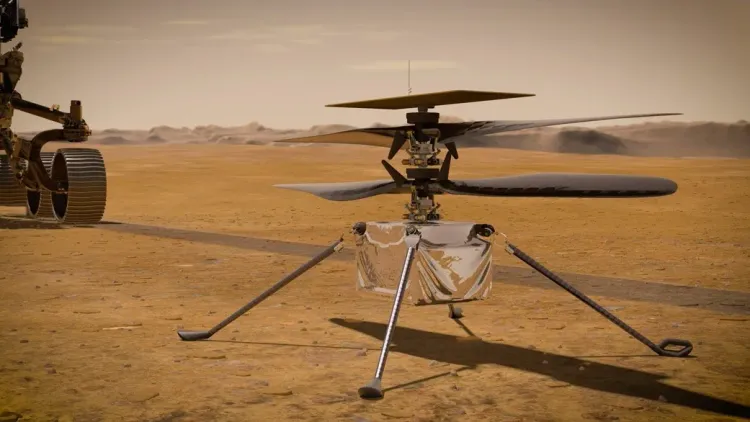NASA Investigates the Ingenuity Helicopter Grounded on Mars

Los Angeles, Dec 11 (NationPress) NASA engineers have finalized their investigation regarding the agency's Ingenuity Mars Helicopter, which has been permanently grounded on the Red Planet since its last flight in January this year.
Ingenuity made history as the first aircraft to achieve flight on another planet, originally designed to conduct up to five experimental test flights over a period of 30 days.
Having operated for nearly three years, it successfully completed 72 flights, traversing more than 30 times the distance initially planned, and accumulating over two hours of flight time, as reported by NASA on Wednesday, according to Xinhua news agency.
In its final flight on January 18, 2024, Ingenuity ascended to 12 meters, hovering while capturing images. However, it subsequently initiated its descent and landed, resulting in a loss of communications.
The next day, communications were reestablished, and images transmitted six days post-flight indicated that Ingenuity had suffered significant damage to its rotor blades, as per NASA's findings.
The investigation determined that the failure of Ingenuity's navigation system to provide precise data during the flight likely triggered a series of events that led to the mission's conclusion.
The helicopter arrived at the Jezero Crater on Mars on February 18, 2021, where it was attached to NASA's Perseverance rover.
Even though Flight 72 resulted in Ingenuity being permanently grounded, the helicopter continues to transmit weather and avionics test data to the Perseverance rover approximately once a week. This weather data could assist future explorers of the Red Planet, according to NASA.
The insights gained from this investigation are expected to aid in the development of future Mars helicopters, as well as other aircraft intended for exploration on different celestial bodies, as noted by NASA.
Weighing in at 1.8 kilograms, the helicopter was tasked with demonstrating that powered flight is indeed feasible on Mars, despite the planet's thin atmosphere.
Throughout its extended mission, this rotorcraft acted as a scout for the life-seeking, sample-collecting Perseverance.









